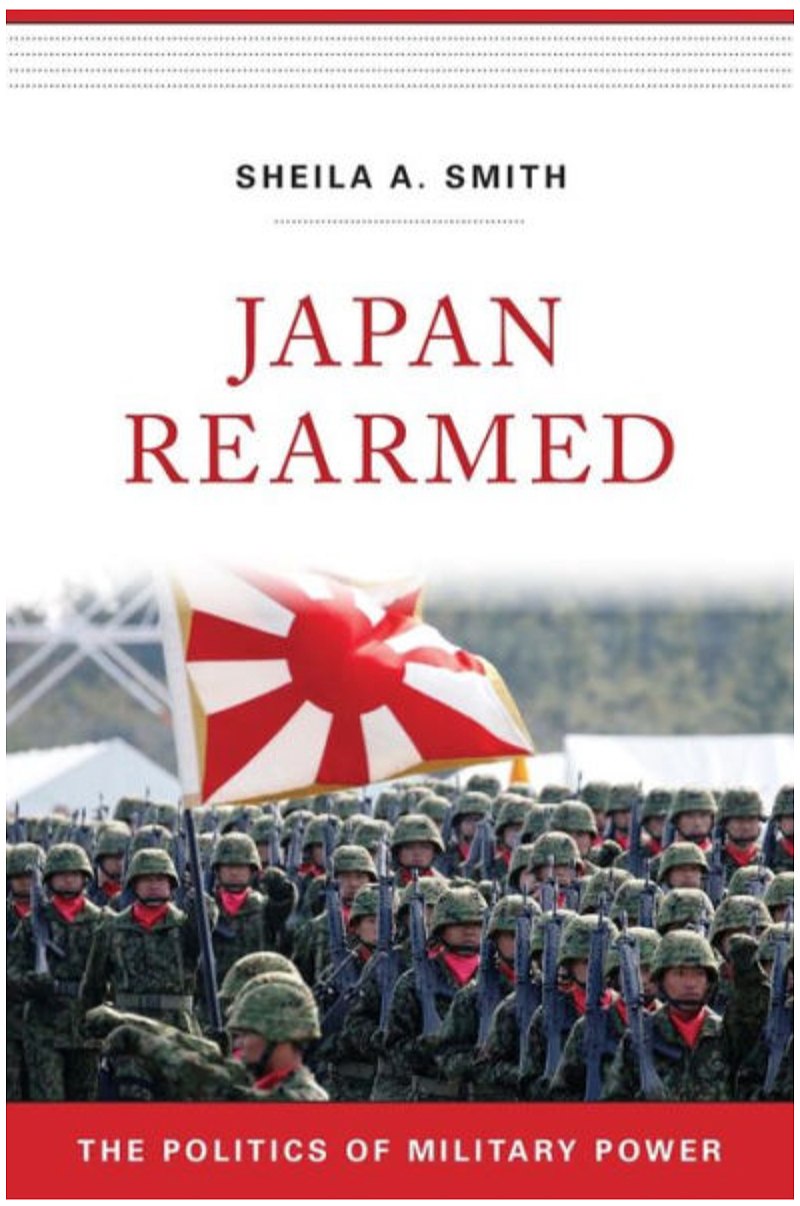[Sheila A. Smith, Japan Rearmed. The Politics of Military Power. Harvard University Press. Cambridge, 2019. 239 p.]
review / Ignacio Yárnoz
 Japan is currently facing a delicate national security status . To the north, the country is constantly subjected to harassment from the Democratic People's Republic of Korea in the form of ballistic missile tests that often land in Japanese territorial waters. To the east and southeast, Japan's sovereignty over its territorial waters, including the disputed Senkaku Islands, is threatened by a China increasingly keen to show economic and military muscle.
Japan is currently facing a delicate national security status . To the north, the country is constantly subjected to harassment from the Democratic People's Republic of Korea in the form of ballistic missile tests that often land in Japanese territorial waters. To the east and southeast, Japan's sovereignty over its territorial waters, including the disputed Senkaku Islands, is threatened by a China increasingly keen to show economic and military muscle.
And as if this were not enough, Japan is already questioning the security that the United States can or will provide in the event of a possible regional conflict. If in the past Japan feared being dragged into a war because of the U.S. predisposition to use fire to resolve certain situations, now Tokyo fears that the U.S. will not join it in defending its sovereignty.
It is this national security dilemma that Japan Rearmed. The Politics of Military Power, by Sheila A. Smith, a researcher at the U.S. Council on Foreign Relations. The book gathers the different views on this issue. The Japanese government's position is that Japan should rely more on itself to maintain its own security. But this is where the biggest obstacle arises. Since its defeat in World War II and subsequent U.S. domination of the country until 1952, the national armed forces have been downgraded to "Self-Defense Forces". The reality is that the 1947 Constitution, specifically article issue 9, continues to limit the functions of Japanese troops.
Introduced directly by the U.S. command, article 9, never amended, reads: "Aspiring sincerely to international peace based on justice and order, the Japanese people Withdrawal forever from war as a sovereign right of the nation and from the threat or use of force as a means of settlement of international disputes. (2) In order to carry out the desire expressed in the preceding paragraph, no land, sea or air forces or other war potential shall hereafter be maintained. The right of belligerency of the state shall not be recognized".
This article, novel at the time, was intended to open an era safe from warmongering tendencies, in which the United Nations project would be the basis for collective security and the peaceful settlement of disputes. However, history itself showed how within a few years the very architects of the Constitution called for Japan's rearmament in the context of the Korean War; it was then too late for a rethinking of the founding limitations of the new Japan.
Following the changes in Asian geopolitics over the past 30 years after the end of the Cold War, Japan has taken steps to regain its international presence, but even today it continues to stumble under the straitjacket of its Constitution. As Smith rightly describes, there are many legal hurdles that the Japan Self-Defense Forces have had to overcome since 1945. Issues such as Japan's performance abroad under the United Nations flag, its absence in the 1st Gulf War, the discussion on the resilience after a North Korean attack or Japan's performance in the 2nd Gulf War are all discussed and analyzed in this book. In addition, the author tries to explain the reasons and arguments in each of the debates concerning article 9, such as self-defense, the role of the Self-Defense Forces and the relationship with the United States, issues that confront the Japanese political elite. Several generations of political leaders have tried to resolve the dilemma of guaranteeing Japan's security and interests without limiting the capabilities of its armed forces, although so far there has been no consensus to change certain constitutional assumptions, a direction in which Prime Minister Shinzo Abe is pushing.
Japan rearmed is a 360 Degrees analysis where the reader finds a complete analysis of the main obstacles faced by the Japan Self-Defense Forces and what their future development can be. In a broader framework , the book also addresses the role of the Armed Forces in a democracy, which must make compatible its rejection of violence with the obligation to guarantee collective defense.